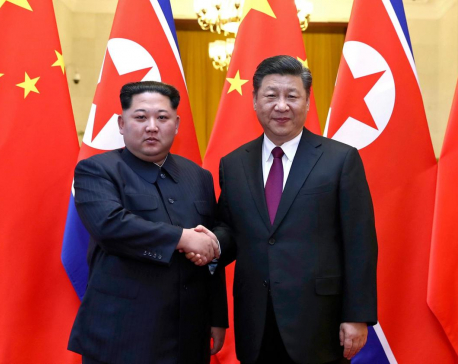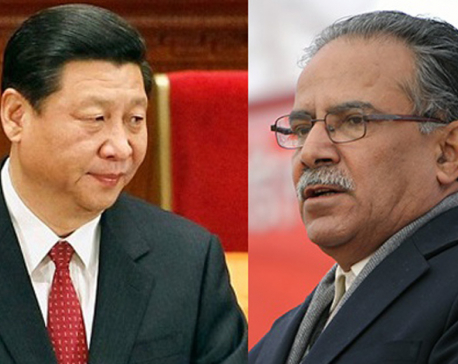
OR

While it is true that Xi is amassing power, his motivation is the need to strengthen China—both its government and economy
Much of the world is watching Chinese President Xi Jinping with concern. Not only has he been re-concentrating power in the hands of the central government; many believe that his radical anti-corruption campaign is a fig leaf for a political purge. They worry that Xi is building a cult of personality, much like the one that surrounded Mao Zedong and fueled the Cultural Revolution.
The truth is far less sinister. While it is true that Xi is, to some extent, amassing power, his motivation is the need to strengthen China—both its government and its economy. To succeed, he must bring a bureaucracy that has spun somewhat out of control back in line.
Over the last three decades, power in China has been decentralized considerably, with provincial and municipal governments receiving, in an incremental fashion, substantial autonomy to experiment and test reforms aimed at attracting foreign investment and spurring GDP growth. Moreover, they have been granted direct control over resources – such as land, finance, energy, and raw materials—and local infrastructure development. As a result, subnational governments accounted for an average of 71 percent of total public expenditure in 2000-2014—a far larger share than in the world’s largest federal countries (US states’ share of public spending, for example, is 46 percent.)
The goal was to spur overall economic growth by encouraging competition among regions. Local party bosses knew that their career paths depended on their municipalities’ economic performance. And by working hard to spur growth, they have fueled China’s rise to become the world’s second-largest economy (by some measures, the largest) and secured the ruling Communist Party’s legitimacy in the post-Mao era.
But decentralization has had its downsides. It has led to substantial waste, exemplified in local governments’ massive debts. And it has spurred large-scale corruption, with local officials striking special deals with businesses to provide, say, tax breaks, cheap credit, or land at below-market prices.
In a country with stringent regulations and underdeveloped financial markets, private entrepreneurs face high barriers to starting and operating businesses. If illicit deals are what it takes to gain access to the resources and markets they needed, private firms have been more than willing to strike them, offering cash or other payments to officials who bent or broke rules on their behalf.
Such arrangements facilitated the entry of hundreds of thousands of growth-enhancing private firms into the market in the late 1990s. In an era when economic growth was the top priority, the corruption that fueled it was tacitly accepted, and even blithely condoned.
But corruption has spun out of control, and now threatens both China’s stability and the Communist Party’s legitimacy. Over three decades of lax governance, some local authorities have formed political cliques that work together to protect their illicit gains and economic interests. Embezzlement and misappropriation of astronomical sums of public funds would have been impossible without accomplices to provide protection and help one another ascend the political ladder.
These stealth political networks became virtually impenetrable, with many officials, by default, becoming the central government’s rivals, fiercely defending their economic interests by safeguarding their official posts and perquisites. Unless it reined in the municipal satraps, the central government could essentially kiss its reform plans goodbye.
So Xi stopped turning a blind eye to corruption. He put some local-government powers back into the hands of the central authorities. And he launched his far-reaching anti-corruption campaign.
Over the last two years, officials from all China’s provinces—ranging from low-ranking department chiefs in ministries to senior provincial leaders—have been incarcerated. Geographical considerations have sometimes been taken into account, with the arrest of an official from a peripheral province followed by the arrest of one from a central municipality.
Rounding up a large number of senior officials (and military officers) who are perceived to be political rivals may look like a purge. But the fact is that all those who have been prosecuted and sentenced to prison terms were found guilty, based on hard evidence. Present-day China, even with its imperfect judiciary, can no longer imprison officials purely on political grounds, as was the case under Mao.
Xi’s efforts to rein in China’s bureaucracy continues unabated. In the short term, economic activity could suffer, as local authorities delay decisions, so as to avoid attracting too much attention to themselves. But once the system is cleaned up, China will be in a much stronger position to achieve sustainable and stable economic growth.
Those who fear Cultural Revolution 2.0 need to understand that China is not the country it was 50 years ago. The soil for authoritarianism and a cult of personality has been plowed under by three decades of increasing openness and economic growth. No one understands this better than Xi.
The author, a professor of economics at the London School of Economics, is a World Economic Forum Young Global Leader and a member of the Richemont Group Advisory Board
You May Like This

Beijing confirms Kim Jong-un’s visit to meet Xi Jinping
BEIJING, Mar 28: China confirmed on Wednesday that Kim Jong-un met President Xi Jinping on a surprise visit to Beijing,... Read More...

Paras leads Nepal XI to victory over Dhangadhi XI
DHANGADHI, April 10: Cracking an impressive half-century, Paras Khadka led Nepal XI to a 31-run victory over Dhangadhi XI in a... Read More...

Dahal to fly off to China on Thursday, to meet Xi Jinping for 15 minutes
KATHMANDU, March 21: Prime Minister Pushpa Kamal Dahal is unlikely to sign any agreements with China during his week long... Read More...

Just In
- World Malaria Day: Foreign returnees more susceptible to the vector-borne disease
- MoEST seeks EC’s help in identifying teachers linked to political parties
- 70 community and national forests affected by fire in Parbat till Wednesday
- NEPSE loses 3.24 points, while daily turnover inclines to Rs 2.36 billion
- Pak Embassy awards scholarships to 180 Nepali students
- President Paudel approves mobilization of army personnel for by-elections security
- Bhajang and Ilam by-elections: 69 polling stations classified as ‘highly sensitive’
- Karnali CM Kandel secures vote of confidence



















Leave A Comment